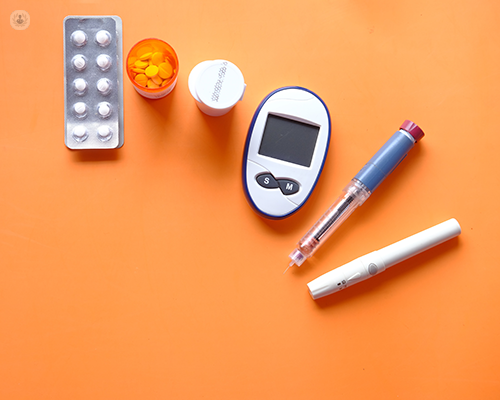Understanding diabetic nephropathy: Causes, symptoms, and prevention strategies
Autore:
Diabetic nephropathy, also known as diabetic kidney disease, is a serious complication of diabetes that affects the kidneys, leading to chronic kidney disease or even kidney failure if left untreated.
Dr Daniel Jones, highly regarded consultant nephrologist, provides an expert insight into the causes, symptoms, treatment options, and prevention strategies for diabetic nephropathy.

What causes diabetic nephropathy?
Diabetic nephropathy develops as a result of prolonged high blood sugar levels, which damage the glomeruli - tiny blood vessels in the kidneys that filter waste from the blood and help maintain fluid balance. Over time, the high blood sugar levels can thicken and scar the glomeruli, leading to decreased kidney function.
Aside from high blood sugar, several other factors can increase the risk of diabetic nephropathy. Hypertension (high blood pressure) is a major contributor, as it can further damage the kidneys' delicate blood vessels. Additionally, genetic predisposition, age, and lifestyle choices also play a role.
People who have had diabetes for over 10 years, especially those with poor blood sugar control or high blood pressure, are more likely to develop this condition.
What are the signs and symptoms of diabetic nephropathy?
Diabetic nephropathy often begins with no noticeable symptoms. In the initial stages, the kidneys can still perform their filtering functions relatively well, even if damage is occurring.
As diabetic nephropathy progresses, the first sign is often the presence of small amounts of protein in the urine, called microalbuminuria. The presence of microalbuminuria can be detected through urine tests.
Subsequently, additional symptoms may start to emerge, including swelling in the hands, feet, face; increased blood pressure; fatigue; reduced appetite and nausea; shortness of breath; and changes in urination patterns.
If diabetic nephropathy advances to end-stage renal disease, complications like anaemia and bone disease can develop.
How is diabetic nephropathy treated?
The treatment of diabetic nephropathy aims to slow the progression of kidney damage, manage symptoms, and prevent kidney failure.
Blood sugar control
Keeping blood sugar levels within the target range is essential. This can be achieved through continuous glucose monitoring, insulin therapy, and oral diabetes medication regimes.
Blood pressure management
Many people with diabetic nephropathy require medications to lower blood pressure, even if they don’t have hypertension. Medications like ACE inhibitors (angiotensin-converting enzyme inhibitors) and ARBs (angiotensin II receptor blockers) are often prescribed to reduce protein loss through urine.
Dietary adjustments
A diet that limits sodium, protein, and potassium can help reduce the strain on the kidneys. Reducing protein intake, in particular, can also reduce stress on the kidneys, helping lower proteinuria (excess protein in the urine).
Cholesterol management
High cholesterol can worsen kidney damage, so managing cholesterol with medications like statins can be beneficial in preventing cardiovascular complications, which are more common in people with kidney disease.
If diabetic nephropathy advances to end-stage renal disease, dialysis or even a kidney transplant may become necessary. Dialysis is a medical procedure that filters waste products and excess fluid from the blood, while a transplant involves replacing the damaged kidney with a healthy donor kidney. Both treatments can be lifesaving for people with severe kidney disease.
Can diabetic nephropathy be prevented?
Diabetic nephropathy can often be prevented, especially through effective control of blood sugar and blood pressure. While it’s a common complication of diabetes, it doesn’t always result in kidney failure.
When diagnosed early, lifestyle adjustments, medication, and consistent monitoring can slow the progression. In particular, engaging in regular screenings, including annual urine tests to check for protein levels and routine blood tests for kidney function, are also essential to detect early signs of kidney damage before symptoms appear.
Furthermore, other effective strategies for preventing diabetic nephropathy include regular exercise (at least 150 minutes of moderate aerobic activity each week), avoiding smoking and excessive alcohol intake, and maintaining a healthy weight.
If you would like to book an appointment with Dr Daniel Jones, head on over to his Top Doctors profile today.


